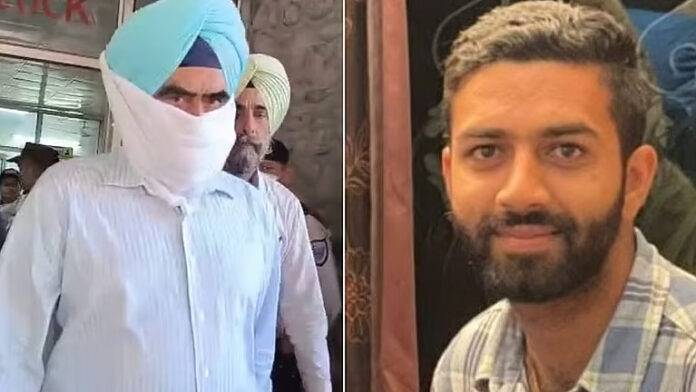The CBI’s argument in court also highlighted that a thorough investigation into Bhullar’s case would expose the involvement of some police and judicial officers in this network of bribery and corruption.
Amid a day-long drama , the special court ordered to send suspended DIG Harcharan Singh Bhullar, in CBI custody for five days on Saturday. Both the federal investigation agency CBI and the Punjab Vigilance Bureau had sought Bhullar’s remand from the respective courts in Chandigarh and Mohali. CBI prosecutor Narendra Singh had to shuttle between Chandigarh’s Sector 43 court complex and the Chief Judicial Magistrate’s court in Mohali during these proceedings.
It is noteworthy that the CBI arrested Punjab Police DIG Harcharan Singh Bhullar following a complaint from Akash Batta, a Punjab-based scrap dealer. Bhullar is accused of accepting a bribe of ₹5 lakh through an intermediary, Krishanu Sharda. The arrest took place on October 16th. After being produced in court, Bhullar was sent to Chandigarh’s Burail Jail in judicial custody. Bhullar, an Indian Police Service officer, has been suspended in the meantime. Subsequent raids on Bhullar’s various properties yielded cash worth crores, luxury cars, expensive watches, and other valuables. Following an investigation into Bhullar’s mobile phone data and documents recovered during the raids, the CBI also filed a disproportionate assets case against Bhullar on October 29th.
The Punjab Vigilance Bureau had also filed a disproportionate assets case against DIG Harcharan Singh Bhullar on Friday.
On Saturday, the CBI court of Special Judge Bhavana Jain remanded Bhullar to five-day CBI custody. The suspended DIG will now appear in court on November 6th.
Granting the accused custody, the CBI court stated that given the vast amount of data allegedly recovered from the DIG’s mobile phone, he is remanded in police custody until November 6th to conduct a fair and effective investigation to “trace the source of the bribe money, identify the ultimate beneficiary, and confront him with the information provided by his co-accused.”
CBI prosecutor Narendra Singh told the court that two mobile phones belonging to the accused DIG were seized at the time of his arrest, and preliminary investigations revealed extensive conversations and messaging between the accused and the co-accused. “Many of the chats indicate a pattern of influencing judicial officers and decisions,” Narendra Singh told the court.
The CBI further argued that custodial interrogation of Bhullar was necessary to confront him with the digital data extracted from his mobile phone and identify other public servants and government officials involved in illegally influencing judicial decisions. For this purpose, Bhullar needed to be confronted with the middleman/facilitator, Krishanu Sharda who is already in CBI custody.
This is how the dramatic events unfolded:
The Punjab Vigilance Bureau had filed a disproportionate assets (DA) case against the DIG on Friday. Based on this, the Bureau sought a production warrant for Bhullar in the Chief Judicial Magistrate’s court in Mohali on Saturday morning. Meanwhile, the CBI also took immediate action. It first filed an application seeking Bhullar’s custody in the Chandigarh CBI court, and then prosecutor Narendra went to the Mohali CJM court and informed the judge about the CBI’s remand request. The Mohali court then reserved its order for Monday.
As arguments began in the Chandigarh CBI court for Bhullar’s five-day remand, officials from the Punjab Vigilance Bureau also arrived. The Vigilance Bureau argued that the accused should also be produced in the Mohali court in the disproportionate assets case. This led to a heated exchange between the CBI and the Vigilance Bureau. The Chandigarh CBI court remanded Bhullar to five days’ custody.
Judge Bhavna Jain ruled that the FIR filed by Punjab in the disproportionate assets case does not hamper the impartial investigation of the main corruption case.
The prosecutor for the Punjab Vigilance Bureau urged the court that the accused was interrogated inside the jail on Friday on the orders of the Chief Judicial Magistrate (CJM)-Mohali and he must be produced before the Mohali court within 24 hours of his arrest. The CBI court rejected the Vigilance Bureau’s request on the grounds that the impartial investigation of the case cannot be hampered merely because the accused’s arrest was registered by the Punjab Police and he must be produced before the Chief Judicial Magistrate’s court in Mohali.
Meanwhile, Bhullar’s defence lawyer argued that since the accused is working under the Punjab government, the CBI must obtain the state government’s consent before his arrest.
Bhullar’s counsel argued that the CBI was seeking custody solely to circumvent the authority of the Punjab Police, and therefore, this application had been filed in this court. Bhullar had been employed in the state of Punjab, and therefore, the CBI was required to obtain permission from the Punjab government for his arrest under Section 6 of the Delhi Special Police Establishment Act (DPSE), 1946. However, no such consent was obtained.”
Refuting this ground, the CBI stated that accused Bhullar was arrested on October 16, but at that time, the defense counsel never challenged the jurisdiction of this court, nor did they allege that the arrest was inconsistent with the rules. The court stated, “The accused is not a layman, but a senior police officer and is believed to be well aware of his legal rights.”
What the court said:
The court noted that the complaint was filed at the CBI office in Chandigarh. “The verification of the allegations, laying of a trap, and the contact details of the accused were all located in Chandigarh, and subsequently, a controlled WhatsApp call was made by co-accused Krishanu to accused HS Bhullar in Chandigarh. Therefore, it cannot be held that the FIR registered by the CBI could not have been lodged here or that it had to be registered only in Punjab.”
The court said, “This is a sensitive case involving allegations of bribery against a senior police officer. Citing a Supreme Court judgment and the DSPE Act, 1946, the court said that it applies to the whole of India. At this stage, there is nothing to suggest that the arrest of HS Bhullar or the registration of an FIR by the CBI in Chandigarh, is improper or unnecessary.”
Mohali Court’s Directive to the Vigilance Bureau:
Later, the Mohali CJM Court ruled that if any application is filed by the Vigilance Bureau or the accused, prior notice should be issued to the CBI to avoid conflict between the two courts. The Court stated that the CBI has parallel jurisdiction in cases under the Prevention of Corruption Act. The Court ordered, “The judicial propriety is that if any order is passed by the Vigilance Bureau regarding the production/custody of the accused, it would be appropriate to issue prior notice to the CBI before that.”















